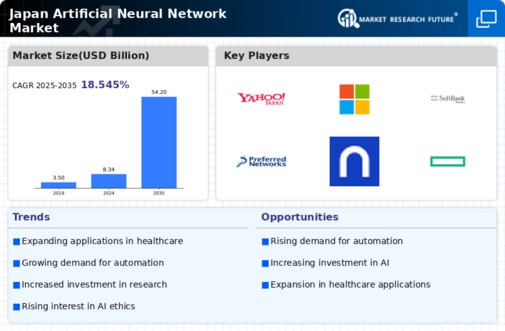Growing Demand for Automation
The Japan artificial neural network market is experiencing a notable surge in demand for automation across various sectors. Industries such as manufacturing, logistics, and finance are increasingly adopting artificial neural networks to enhance operational efficiency and reduce human error. For instance, the integration of neural networks in supply chain management has led to improved forecasting accuracy, which is crucial for maintaining competitive advantage. According to recent data, the automation market in Japan is projected to grow at a compound annual growth rate of approximately 8% over the next five years. This trend indicates a robust appetite for advanced technologies, positioning the Japan artificial neural network market as a key player in the broader automation landscape.
Increased Focus on Cybersecurity
The Japan artificial neural network market is also being driven by an increased focus on cybersecurity. As cyber threats become more sophisticated, organizations are turning to artificial neural networks to bolster their security measures. These networks can analyze patterns in data traffic and detect anomalies that may indicate potential breaches. The cybersecurity market in Japan is projected to grow to USD 3 billion by 2026, with a significant portion of this growth attributed to the adoption of neural network-based solutions. This trend highlights the critical role that artificial neural networks play in safeguarding sensitive information and maintaining trust in digital systems. As businesses and government entities prioritize cybersecurity, the Japan artificial neural network market is likely to see substantial growth in this domain.
Rising Investment in AI Startups
The Japan artificial neural network market is witnessing a surge in investment directed towards artificial intelligence startups. Venture capital firms and corporate investors are increasingly funding innovative companies that specialize in neural network applications. This influx of capital is fostering a vibrant ecosystem for research and development, leading to the emergence of novel solutions tailored to specific industry needs. For example, startups focusing on healthcare applications are developing neural network models that enhance diagnostic accuracy and patient care. In 2025, investments in AI startups in Japan reached approximately USD 800 million, indicating a strong belief in the potential of artificial intelligence. This trend is likely to propel the Japan artificial neural network market forward, as new technologies and applications continue to emerge.
Integration of AI in Smart Cities
The Japan artificial neural network market is increasingly intertwined with the development of smart cities. As urban areas in Japan strive for sustainability and efficiency, artificial neural networks are being integrated into various city management systems. These systems utilize neural networks for traffic management, energy distribution, and public safety, thereby enhancing the quality of urban life. The Japanese government has allocated significant funding towards smart city initiatives, with an estimated investment of USD 1 billion planned for the next five years. This commitment underscores the potential for artificial neural networks to play a pivotal role in urban development. Consequently, the Japan artificial neural network market is poised to expand as cities adopt these advanced technologies to address complex urban challenges.
Advancements in Machine Learning Technologies
The Japan artificial neural network market is significantly influenced by rapid advancements in machine learning technologies. Innovations in deep learning algorithms and computational power are enabling more sophisticated neural network models, which can process vast amounts of data with greater accuracy. This evolution is particularly evident in sectors such as finance, where predictive analytics powered by artificial neural networks are transforming risk assessment and fraud detection. The market for machine learning in Japan is expected to reach USD 1.5 billion by 2026, reflecting the increasing reliance on these technologies. As organizations seek to leverage data-driven insights, the Japan artificial neural network market stands to benefit immensely from these technological advancements.




















